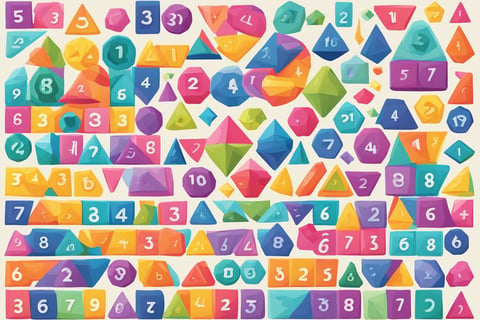Math Development for Kids: Strategies to Boost Early Learning
Strategies to Boost Early Learning. Learn number sense, shape recognition, & problem-solving through engaging activities.
MATHMATH TODDLERS
11/19/20242 min read
Math Development for Kids: Strategies to Boost Early Learning
Children thrive when they engage in activities that promote their intellectual development. Fostering math skills at a young age is crucial for nurturing logical reasoning and problem-solving abilities. Parents and educators can play a significant role by integrating fun and engaging math activities into everyday learning.
Developing math knowledge doesn't have to be a daunting task. Using everyday experiences like shopping, cooking, and playing games can make learning math fun and relatable. These activities help children understand that math is not just about numbers but a part of daily life and decision-making.
Offering encouragement and celebrating small achievements can boost a child's confidence and interest in math. By creating an environment that promotes curiosity and exploration, adults can cultivate a lifelong appreciation and understanding of math in young learners.
Foundations of Math Learning
Establishing a strong foundation in math for children involves developing essential skills such as number sense, shape recognition, and problem-solving abilities. These form the core of mathematical understanding and critical thinking.
Understanding Number Sense
Number sense is a fundamental component in early math development. It refers to the ability to recognize and work with numbers, including skills like counting, comparing quantities, and understanding number relationships. Children typically begin by learning to count objects, which helps them grasp the concept of quantity and sequence.
As kids progress, they start to understand that numbers represent specific amounts. They develop a sense for larger and smaller numbers and can compare and order them. Activities like grouping objects and playing with number-based games can further enhance their understanding.
Teachers and parents play a key role in nurturing these skills by providing engaging and challenging activities that encourage exploration and curiosity. Frequent practice and real-life applications of numbers help solidify number sense in young learners.
Recognizing Shapes and Patterns
Recognizing shapes and patterns is a crucial aspect of mathematical learning. Children often start by identifying basic shapes such as circles, squares, and triangles. This recognition forms the basis for more complex geometric understanding.
Patterns are another essential component that aids in predicting and reasoning skills. Young learners can explore patterns through activities such as arranging colored blocks in sequences or identifying patterns in everyday objects. These exercises enhance observation and analysis skills.
Incorporating both visual and tactile materials, like puzzles and shape-sorters, can make learning about shapes and patterns interactive and fun. A strong grasp of these concepts helps children develop spatial awareness and lays the groundwork for geometry.
Early Problem-Solving Skills
Developing problem-solving skills is vital in math education and beyond. Early exposure to problem-solving encourages logical reasoning and analytical thinking. Even simple tasks, like finding the missing piece of a puzzle, can develop these skills significantly.
To foster these abilities, children should be given opportunities to explore different solutions to a problem. Encouraging them to ask questions and work through challenges with guidance helps build confidence.
Interactive activities, such as board games and logic puzzles, provide fun yet effective ways to practice problem-solving. These experiences teach children how to approach problems methodically and think critically, laying a solid foundation for more advanced math skills.




Explore
Discover engaging educational toys and learning tools.
Contact Us
thescholarlysandbox@outlook.com
© 2025. All rights reserved.
Affiliate disclosure: As an Amazon Associate, we may earn commissions from qualifying purchases from Amazon.com.
